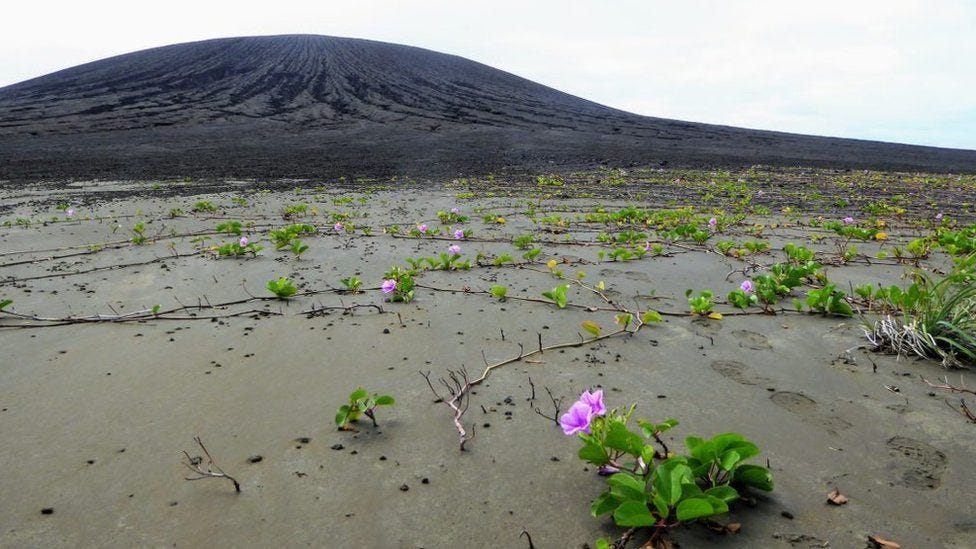If you’re new to this newsletter, it’s probably because you heard my very enjoyable chat with Mike and Ian on The Lubber’s Hole: A Patrick O’Brian Podcast. Welcome! It was a blast talking O’Brian with other devoted fans, and I hope I get to do it again sometime. The ostensible purpose of my visit with Mike and Ian was to discuss the curious case of Nathaniel Martin, the one-eyed parson, naturalist, surgeon’s mate, and friend of Stephen who makes his first appearance in The Ionian Mission. In my giddy excitement, I fear I wasn’t quite as focused on Martin in our conversation as my hosts might have expected. His story reaches something of a conclusion in the sixteenth novel, The Wine-Dark Sea, so if you want to hear my thoughts on his character put into a slightly more sober frame, read on!
When I picked up this novel for the present reread (my fourth), I puzzled over the title. Jack and Stephen have been on a seemingly interminable voyage across the Pacific, bound for South America on a secret mission to support the independence of Spanish colonies, for three novels now, but the phrase “wine-dark sea” is a Homeric epithet referring specifically to the Aegean. Homer’s phrase, oînops póntos, literally means “wine-eyed” or “wine-faced,” and may refer less to the color of wine than to the face of a drunken man, which is appropriate given that the phrase appears most frequently to describe rough and stormy waters. The first chapter finds the Surprise in pursuit of the American privateer Franklin through a literally wine-dark Pacific that fills Captain Aubrey and his crew with uneasiness. Stephen Maturin, the lubber, appreciates it on a purely aesthetic level: “It is a great satisfaction to see the ocean a colour so near to that of new wine – of certain kinds of new wine – as it comes gushing from the press.”
Maturin addresses this remark to his companion Martin. It is curious to me how similar their names are; equally curious is the fact that this Martin is the second man of that name to serve as Stephen’s assistant. Back in Desolation Island his mate about the horrible old Leopard was a Channel Islander named Martin who assisted Stephen ably before succumbing to the jail fever that killed so many of the ship’s passengers and crew. It’s not too surprising that O’Brian would recycle a few names as he churns through twenty-one novels over the course of three decades, but I wonder what appealed to him about this particular name. The most famous Martin is Martin Luther; maybe that fiery reformer, with his finely developed sense of the loathsomeness of sin, is the major clue to Parson Martin’s character as it plays out in The Wine-Dark Sea, his final voyage. Of course, a purple martin is also a kind of bird, one might even say a wine-dark one, a passerine native to the Americas, which is where the Surprise is headed.
Back to the wine-dark sea, which continues to disturb Jack for its strange behavior. “What really puzzles me,” he tells Stephen, “is that every now and then, quite independent of the swell, the sea twitches: a quick pucker like a horse’s skin when there are flies about.” The situation becomes ever less explicable: as Jack and Stephen are sitting down to their music that evening, Stephen asks Jack if the weather is very disagreeable above:
‘It is not so much very disagreeable as very strange,’ said Jack. ‘As black as can be, of course – never the smell of a star – and wet; and there are strong cross-seas, apparently flowing in three directions at once, which is contrary to reason. Lightning above the cloud, too, showing deep red. Yet there is something else I can hardly put a name to.’
The something else turns out to be an underwater volcanic eruption, though this does not become clear immediately: when jets of fire are seen and “something like rocks or even grapeshot” begins striking the sails, the deck, and the crew, the first conclusion is that they have somehow come under mortar fire. Only in the next chapter, in the morning, beholding “a newly-arisen island of black rock and cinders,” does it become clear to the crew what has occurred.

The eruption severely damages the Franklin, making its capture inevitable; it belongs to a Monsieur Dutourd, the gentleman with utopian political schemes who hoped to establish a perfect society on a Polynesian island in the previous novel. (Oddly, once again O’Brian has recycled a name, this time more ominously; Dutourd was the name of the French intelligence agent who captured and tortured Stephen back in H.M.S. Surprise.) There is more to say about Dutourd and his Rousseauian belief in the perfectibility of man, but let’s stick for now with Martin, a man whose imperfections first manifested in Clarissa Oakes/The Truelove and which come to a climax here.
Like so many of what I’ve called the series’ counter-characters, Nathaniel Martin has functioned in most of the novels as a kind of foil or mini-me, in this case to Stephen rather than Jack. Like Stephen, he is a hopeless landlubber, attracted to the seafaring life by the opportunities for natural philosophy—Martin’s passion is for birds. Like Stephen, he is always a little out of place in the seagoing community of a man o’ war, but whereas Stephen is caressed by the crew for his skill in surgery and his status as the captain’s “particular friend,” Martin is merely tolerated. He is, after all, an Anglican clergyman, even if for the last several novels his primary function has been to serve as surgeon’s mate, and parsons are seen as unlucky, if not positively as Jonahs. More problematic is the fact that Captain Jack does not like him. He esteems and respects him, enough to grant him the livings of the parish Jack controls as lord of the manor, but his respect for the cloth inhibits his usually careless speech whenever Martin is around; Jack feels that he cannot be himself. The crew intuits their captain’s dislike, and this inclines them to hold themselves a bit aloof.
Moreover, Jack is jealous of Martin, for he often takes Stephen away on birding expeditions, or else they are up all night dissecting together. One of the recurring themes of these novels is the loneliness of command: since a Royal Navy captain has godlike powers aboard his own ship, he is apt to be deprived of ordinary human companionship, surrounded as he is by men who are awe of him, forbidden to speak first. Jack’s singular luck is to have Stephen as a friend, nominally under his command but largely oblivious to hierarchy, so that they can nearly always speak freely together. In a very real sense, Jack’s friendship with Stephen humanizes him, preserving him from the coldness, rigidity, and cruelty that seems to characterize so many of the most powerful men we encounter in the series. (Stephen also raises Jack’s rather limited political consciousness; I hope to come back to this when we get to the next novel, The Commodore.) When the two are separated, Jack’s ill-humor comes to the fore; we saw this toward the end of The Nutmeg of Consolation, when Stephen’s focus on Australian wildlife and on Padeen very nearly leads to a serious rupture between the friends. Martin represents another such threat.
For much of the series, Martin presents as a comic character. The animals he loves rarely reciprocate his affections; we learn that he lost his eye to an owl whose nest he was investigating too closely, and the injuries Martin sustains from various irate animals turns into a running gag. (Stephen, by contrast, is immediately loved and trusted by nearly all the animals he encounters.) Though a parson, Martin is no orator, and on the occasional Sundays for which he is called upon to deliver a sermon, he either fails to hold his congregation’s attention or inadvertantly spooks or alienates them (though in The Ionian Sea his sermon succeeds in convincing the cheerfully murderous crew to stop killing a bevy of quails that has abruptly descended on the ship). My favorite Martin moment is when he comes aboard the Dromedary in Treason’s Harbour to admire Dr. Maturin’s diving bell, and ends up tagging along on the mission because the two men were too engrossed to notice that the ship had left the dock. For once, the sight of him lightens Jack’s heart: “He turned, and his grim expression instantly lightened as he caught sight of Stephen and Martin. They were still both standing transfixed on the penultimate step of the ladder, which cut them off at the knee, and they were both staring away to leeward with their mouths open, looking like a pair of moonstruck landsmen.”
The Martin of this novel is less amiable. Stephen reflects on his friend’s character as he contemplates the delicate task of welcoming a new officer to the gunroom:
Martin would certainly mean well, but he had always been more sensitive to the feelings of birds than to those of men, and prosperity seemed to have made him rather selfish. Although he was sailing as Stephen’s assistant he was in fact a clergyman and Jack had recently given him a couple of livings in his gift with the promise of a valuable third when it should fall in; Martin had all the particulars of these parishes and he discussed them over and over again, considering the possibility of different modes of gathering tithes or their equivalent and improvement of the glebes. But worse than the dullness of this conversation was a self-complacency that Stephen had never known in the penniless Martin of some years ago, who was incapable of being a bore.
Even Martin’s care for birds seems to desert him as The Wine-Dark Sea goes on; strolling on the quarterdeck together, Martin confesses, “An odd, somewhat disturbing thing happened to me this morning. I was coming back from the Franklin when Johnson pointed out a bird, a small pale bird that overtook us, circled the boat and flew on: certainly a petrel and probably Hahnemann’s. Yet although I watched it with a certain pleasure I suddenly realized that I did not really care. I did not mind what it was called.” The breach between them widens when Stephen makes an anatomical discovery about the bone structure of the frigate-bird and Martin responds cuttingly that he believes some naturalists take specimens out of mere bloodlust. Stephen is wounded by this. But it is not really Stephen’s lust that Martin has in mind.
Martin’s turn toward “being a bore” began in Clarissa Oakes/The Truelove, but as Stephen eventually discovers, his friend’s self-complacency conceals a profound anxiety, a psychic wound. Martin was one of the many officers and men who fell under the spell of the mysterious Clarissa Oakes, and whose normally pleasant personality has taken a sharp turn toward the jealous and saturnine because of it. Although Clarissa has left the ship by the time The Wine-Dark Sea begins, she is still very present to Martin’s mind. Though we never learn to what extent, it’s clear that he’s been sexually intimate with her to some degree, and he is tormented by guilt—a torment intensified by his belief that Clarissa has given him an STI. In a carefully developed subplot, we learn that, owing to a shortage of fresh water, the men’s clothes can only be washed in salt water, which has an abrasive effect on the skin. Believing that the sores caused by the salt are the signs of syphilis, without consulting Maturin he doses himself repeatedly with mercury, permanently damaging his health and making it necessary for him to leave the sea.
Martin and Stephen are reconciled by the time that the parson is put ashore in Peru, to recover from his illness and be sent home. As so often happens with Stephen the medical man, Martin treats him as a confessor.
‘I was desperate,’ said Martin, his mind fixed on that dreadful past. ‘I was unclean, unclean: rotting alive, as the seamen say. A shameful death. And I think my mind was disturbed. Until you absolutely asserted that these were salt-sores I was wholly convinced that they were of sinful origin: you will admit they were very like. They were very like, were they not?’
‘When they had been exacerbated by an immoderate use of mercury, perhaps they were; though I doubt an impartial observer would have been deceived.’
‘The wicked fleeth where no man pursueth,’ said Martin. ‘Dear Maturin, I have been a very wicked fellow. In intention I have been a very wicked fellow.’
Martin’s intimacy with Mrs. Oakes likely extended no further than kissing and petting. But his real sin, I think, has been to permit himself to be turned away from his most natural and spontaneous attachments toward a preoccupation with the self, exacerbating his separation from the community that has been his home. I am increasingly convinced that what these novels are ultimately about is the search for the fullest possible experience of humanity and the sometimes conflicting search for life at its fullest intensity. Martin has fallen between these points, and he suffers greatly for it.
I don’t have space to treat the actual plot of this novel, in which the Surprise finally touches at Peru, and Stephen embarks on his mission to support the independence movement there—a mission doomed in part by the Frenchman Dutourd, who escapes the Surprise with the aid of some of its more democratically minded crewmembers, and blows Stephen’s cover. But I hope to come back to the problem of revolution versus the reform or amelioration of systemic evils when I get to The Commodore, in which Jack and Stephen for the first time confront the evils of the slave trade in the flesh.
If you like how I write, please consider buying or asking your local library or bookstore to acquire my most recent books! If you’d like to learn a bit more about them first, listen to the interview I did recently on the Dorothy’s Place podcast with Elias Crim.
By turns lyric and hypnotic, How Long is Now examines the delicate membranes separating past and present, authenticity of experience and transgressive truth. A Jewish-American writer, plagued by poetry and history, leaves his dying father and faithless marriage to travel to Germany and later Morocco to attend a William Burroughs conference, an unwritten novel on his plate. Enter a mysterious film, a cocktail of wild characters, and a fractured narrative that attempts a reimagining of his parents’ early courtship while his own life destabilizes into a sad, metaphysical travelogue, and we’re left beguiled by the wondrous, bitter nature of a reality that’s more cut-up than consistent, a Beckett play on deepening failure and paranoia. Hope is not lost, however—it just comes with a price—and as we’re ushered through a lengthening series of psychological obstacles and aesthetic quandaries, we come closer to understanding what that price may be. —Joe Pan
Available from your local independent bookstore or Amazon.
“Who may reach into the depths of terror, but lovers?” asks the MASTER in Joshua Corey’s spellbinding new collection. The question unfolds and folds back on itself multiplying in breathtaking, visionary waves. In this erudite and unflinching landscape, the characters (Hannah Arendt, Martin Heidegger, Simone Weil, to name a few) exist both at the margins and at dead center of the 20th century’s furious catastrophes. Being and non-being, poetry and philosophy, fiction and nonfiction, prayer and play, crash into each other creating luminous shards of history, desire, and heartache. Structured like an epic riddle, this book is the perfect mirror in which to discern the resurgence of fascism today. — Sandra Simonds
Available from your local independent bookstore or from Amazon.








